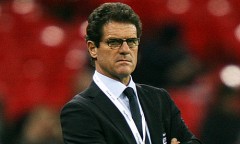
Fabio Capello is a well-established football manager and former player who was, until recently, in charge of coaching the English national football team. His resignation from that post came unexpectedly in early February 2012, following a meeting with FA chairman David Bernstein and general secretary Alex Horne regarding the removal of John Terry as captain of the team.
The reason for John Terry's suspension
John Terry, a footballer who can include captaining both Chelsea FC and the England national squad on his CV, was involved in somewhat of a footballing scandal when he was caught on camera racially abusing an opposing player during a Premier League match in October 2011.
Although Terry protested his innocence, uproar from both the media and the public followed the incident, and he was subsequently charged with a racially-aggravated public order offence by the CPS (Crown Prosecution Service). However, he controversially remained captain of both his club and country until the Football Association (perhaps bowing to public pressure) decided to strip him of the England captain's armband.
Capello leaves the England team!
Fabio Capello, reacting to the FA's decision to strip John Terry of his role as England captain, was quoted in a sports interview criticizing the FA's actions. His argument was that Terry had not been officially found guilty of any offence, and that to strip him of the captaincy would therefore be tantamount to passing judgement on a matter that was still in the hands of the courts. Capello was quoted by Italian broadcaster RAI as saying:
"The court will decide. It’s going to be civil justice, not sports justice, to decide if John Terry committed that crime that he is accused of. And I thought it fair that John Terry keeps the captain’s armband.”
The FA summoned Capello to a meeting to explain his outburst at which it was later to emerge that he had handed in his resignation - claiming that his position had become untenable, mainly due to the way that the FA had undermined him in opting to deal with the Terry case themselves and without consulting him.
Fabio Capello and his many critics
Criticism of Capello's decision to resign was especially pointed due to the fact that his departure left England without a manager when the team was only four months away from a major tournament. Capello's contract would have seen him lead England into Euro 2012, and although England eventually managed to find a successor in Roy Hodgson, the team was left in disarray, lacking both morale and confidence.
The argument against Capello is mainly that he should have been able to swallow his pride and accept that the FA had deemed it necessary to intervene in the Terry situation to prevent increasingly negative press and media pressure. Many people feel that, by resigning, Capello made a choice to put personal pride before his contractual and moral obligations to the England team.
Fabio Capello taking a stand against football culture
Although Capello's departure did leave the England footballing set-up with little time to regroup and prepare for Euro 2012, a number of fans and reporters did openly support Capello's decision, and some felt that, in objecting to the FA's meddling, Capello was, in a sense, standing up for football managers around the world.
The role of a football manager can be a stressful job at the best of times. These days there seems to be an added pressure to deliver results in an often impossibly-short period of time. This culture is partly due to the amount of money currently involved in professional football, a situation which causes owners, investors and board-members to be anxious to see returns on their funding, and to become impatient when team managers struggle to translate financial support into footballing success. Although the dynamics of the national team set-up are different from those operating at club level, an example of the 'job security' enjoyed by football managers can be highlighted in the case of Chelsea FC, who have had seven different managers between 2007-2012 alone.
Not only is a football manager's job insecure, but owners or board-members are often accused of interfering with the manager's responsibilities, even going as far as picking the team or acquiring players without consulting the manager on occasion. In this context, Capello's decision to stand up to the FA and to refuse to back down on a matter of principle was viewed by some as demonstrating a steely determination not often seen in similar circumstances. It was felt that managers too often appear happy to grin and bear the situation, and to perceive inappropriate intervention from above as a fair exchange for their own lucrative salaries. Therefore, many people saw Capello's willingness to go against that trend as showing commendable strength of character, and reflecting personal qualities such as determination and self-belief that had presumably led to his appointment as England manager in the first place.